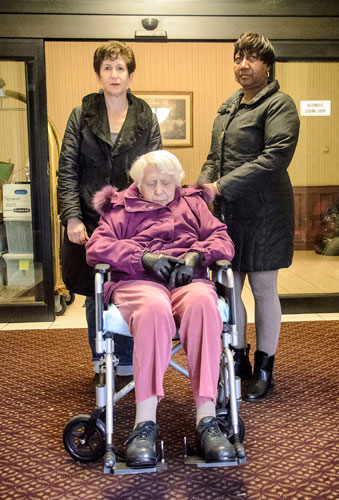The owner of a tony Grand Army Plaza old folks home who has spent the past eight months trying to evict his elderly tenants isn’t doing it fast enough, according to a lawsuit by the real estate investors who want to buy the building for $76 million.
Family members of patients at Prospect Park Residence have fought the closure since it was announced in March, with one allied pol saying that it is part of a rush to remove the old-timers to cash in on the prime real estate. The newly revealed court documents, which show that the sale was agreed upon in January, appear to show he was right.
In the months since the move to evict the oldsters began, their relatives have sued and a judge has temporarily blocked the closure, but only eight remain and their kin now charge that owner Haysha Deitsch is diminishing services to drive out the holdouts.
Word of the soured property sale came as a surprise to the embattled relatives of current and just-departed tenants.
“This shows how much disdain and total lack of respect they have for the residents,” said Andrew Kessler, who moved his 92-year-old grandmother to another assisted living facility in Brooklyn several weeks ago. “They have done irreparable harm.”
The agreement to sell 1 Prospect Park West, a block-long property that overlooks Grand Army Plaza and Prospect Park, was made more than a month before director David Pomerantz’s March 7 announcement that the 125 residents had 90 days to hightail it out of there. Pomerantz claimed financial woes due to tax increases.
Deitsch bought the property in 2006 for $40 million, meaning he will nearly double his money if the sale goes through.
Sugar Hill Capital, a Manhattan investment firm, inked the agreement with Deitsch on Jan. 27, saying it would fork over $76.5 million on the condition that Deitsch clear out the special-needs facility, specially tailored for dementia patients, that takes up the fourth floor, and that the Department of Health approve a closure plan. The agency signed off on the plan in early March, but resident advocates charge that government bean counters rubber-stamped the document without an appropriate review.
Court orders are now staving off eviction for the elderly people who are left, which puts a wrench in Deitsch’s sale, and which prompted Sugar Hill to take him to court.
In legal documents, Deitsch insists he did everything he was supposed to in order to remove the seniors, and tries to set Aug. 1 as the deal’s closing date. But Sugar Hill balked and Deitsch, apparently afraid that the sale was sunk, tried to argue he should be able to pocket its $7.65-million deposit. Lawyers for the would-be buyer, meanwhile, are trying to expedite the removal of the patients and seeking unspecified monetary damage for what they describe as a bad-faith deal with an unrealistic vacancy date. A longtime foe of Deitsch’s said the landlord is jammed up because he is trying to have it all.
“Deitsch wants to wriggle out of the agreement, keep the $7 million deposit, and turn around and negotiate a sale with another buyer,” said John O’Hara, an attorney who is litigating a separate wrongful-death suit against Deitsch over the demise of Judge John Phillips at Prospect Park Residence.
At a Nov. 12 court hearing, a lawyer for Sugar Hill expressed concern for the tenants duking it out with Deitsch.
“We do not see these people as statistics,” said Joshua Siegel at a Nov. 12 court hearing. “We are very concerned with the allegations against the facility’s operator.”
But Deitsch’s lawyer said that Siegel was just paying lip service to the old people he wants out, and that the families’ lawsuits are lying in their portrayal of Deitsch as a dastardly landlord.
“If you believe everything in the Berger complaint, you know the purchasers knew my clients are terrible people,” said attorney Stuart Blander.
Lawyers for both parties declined to comment on the bombshell litigation and several requests for comment at Sugar Hill Capital Partners went unanswered.
Deitsch is currently facing contempt of court charges for allegedly flouting a court order that requires him to continue providing services to the remaining patients.


























